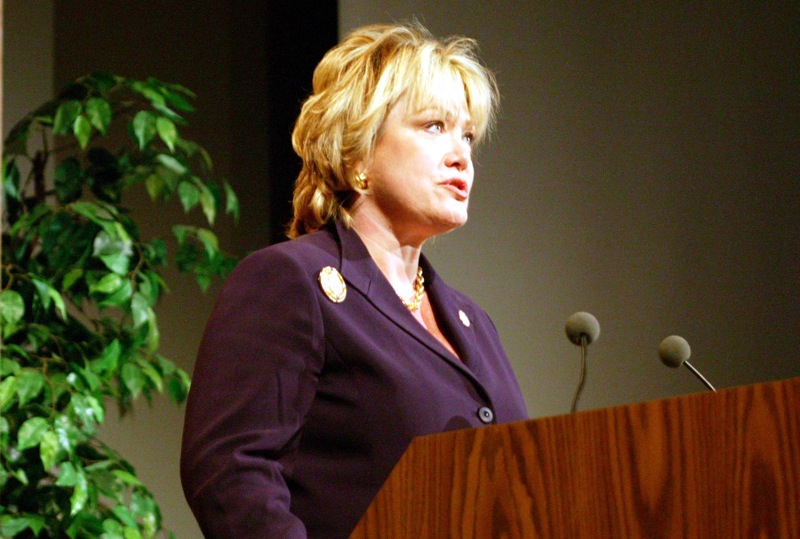Tauscher Signals Leftward Shift on Arms Control
The appointment of Rep. Ellen Tauscher (D-Calif.) is being heralded by progressives as a return to negotiated disarmament accords.
Jul 31, 202098.2K Shares2.2M Views
Rep. Ellen Tauscher (D-Calif.) (Lawrence Livermore National Laboratory)
The appointment of Rep. Ellen Tauscher (D-Calif.) to an important State Department post is being greeted by progressive experts as indicating a shift to the left on arms control, heralding a return to negotiated disarmament accords and strengthened international norms on nuclear proliferation.
Tauscher, a seven-term veteran congresswoman, announced Wednesday that she will give up her seat to become undersecretary of state for arms control and international security, making her the most senior official in the Obama administration to combat the spread of weapons of mass destruction. A former Clinton administration nonproliferation official, Robert Einhorn, was slated to get the job, but reportedly asked to be removed from consideration for what the Washington Post said were personal reasons. While Tauscher has a profile as a conservative Democrat — she headed the pro-business New Democrat Coalition in the House and voted to invade Iraq — liberal observers give her high marks for her longtime interest in disarmament and nonproliferation issues.
Illustration by: Matt Mahurin
“She is universally respected as one of the best thinkers on strategic and nonproliferation policies in the Congress,” said Andrew Grotto, a proliferation expert at the Center for American Progress. Jessica Tuchman Mathews, the president of the Carnegie Endowment for International Peace, said that Tauscher’s appointment and the political climate that generated it indicate that the administration is “absolutely” prepared to cut the United States’ stockpile of nuclear weapons. “The shift in emphasis” away from the Bush administration’s disdain for negotiated arms-control agreements, she said, will be “enormous.”
As ranking Democrat and later chair of the strategic forces subcommittee of the House Armed Services Committee, Tauscher has pushed for a thorough review of the U.S. nuclear arsenal, creating a commission, chaired by two respected former secretaries of defense, that has advocated “dismantl[ing] the deadly nuclear legacy of the Cold War,” as one of its chairmen recently said. Tauscher toldan international security conference in Munich last month that the United States needed to recommit itself to — and in some cases rewrite — international treaties and compacts to strengthen global nonproliferation regimes. “The debate is therefore not about how nuclear powers can position themselves in a world indefinitely held captive nuclear weapons, but how we here can lead the world in a realistic effort to eliminate them,” she said.
Among those measures are the ratification of an international treaty banning the testing of nuclear weapons; new penalties for nations that withdraw from the Nuclear Nonproliferation Treaty; and the authorship of a new treaty banning the production of new fissile material, a key ingredient for the production of a nuclear weapon. At Munich, she publicly welcomed a representative from Iran and called for “immediate and unconditional direct negotiations” with Teheran over its nuclear-energy program.
While Tauscher may become the most prominent official on nonproliferation issues in the Obama administration, she’ll be backed up by several ideological allies. The administration on Tuesday nominatedRose Gottemoeller of the Carnegie Endowment for International Peace to become assistant secretary of state for verification and compliance. As a leading expert on Russian defense issues, Gottemoeller will, if confirmed, likely have the portfolio for negotiating a new treaty with Russia for mutual reductions in both nations’ nuclear arsenals to replace an accord that expires in December. And Einhorn will hold an as-yet-unspecified proliferation portfolio in the State Department as well, according to the Washington Post’s Al Kamen. Grotto noted Tauscher’s political closeness to Secretary of State Hillary Clinton — Tauscher was an early and fervent Clinton supporter during the 2008 Democratic presidential primaries — as well as to national security adviser Jim Jones.
Nonproliferation in the Bush administration was symbolized by John Bolton, the hardline undersecretary of state for arms control in George W. Bush’s first term who clashed frequently with Secretary of State Colin Powell. Bolton disdained the United Nations — he once statedthat it “wouldn’t make a bit of difference” if the United Nations building lost ten floors — and favored a more confrontational approach to nonproliferation, creating a multinational interdiction alliance called the Proliferation Security Initiative, in which partner nations occasionally boarded naval vessels suspected of trafficking component parts of weapons of mass destruction. His tenure was indicative of a shift away from negotiated arms-control agreements toward so-called counterproliferation, in which military approaches to combating the spread of dangerous weapons were employed.
It is unknown whether Tauscher would continue the initiative. Her staff declined interviews in anticipation of her confirmation hearing. Bolton did not respond to a request for comment.
“PSI was a valuable initiative in an otherwise barren field in the last administration,” Mathews said, adding that she wouldn’t be surprised if it continued under Tauscher. But if it does, she added, “it will be now embedded in a very broad range of other bilateral and multilateral arms control initiatives. It’s a completely different picture.”
Update: Tauscher is a seven-term congresswoman, not a six-term congresswoman, as this story originally stated. We regret the error.

Paula M. Graham
Reviewer
Latest Articles
Popular Articles

